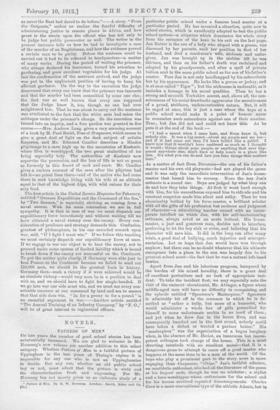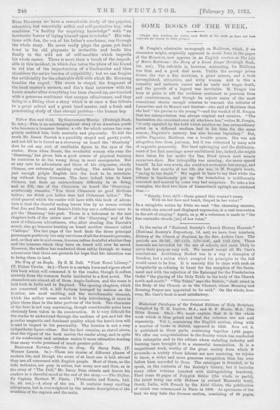NOVELS.
FATHERS OF MEN.*
OF late years the number of good school stories has been substantially increased. We are glad to welcome in Mr. Hornung's new volume yet another addition to this select category. Whether Fathers of Men is a faithful picture of Uppingham in the last years of Thing's regime iii is impossible for any one who is not an Uppingliamian to decide. But any one, whether an old public school boy or not, must admit that the picture is vivid and the characterization fresh and cngroasing. For Mr. Hornung has nob merely given es an elaborate study of a
• Potherd of Moi. By B. W. iionamg. Londmi Smith, Bider awl Co. Okhl
particular public school under a famous bead master at a particular period. Re has invented a situation, quite new in school stories, which is excellently adapted to test the public school system—a situation which dominates the whole story from the entrance of the hero to his exit on the last page. Jan Rutter is the son of a lady who eloped with a groom, was disowned by her parents, sank her position in that of her
husband, and died a coachman's wife, declassee and Infer- given. Jan was brought up in the stables till he was thirteen, and then on his father's death was reclaimed and adopted by his grandparents, and after a spell of private tuition sent to the same public school as the son of his father's master. Poor Jan is not only handicapped by his antecedents but by his appearance. He looks like a groom or jockey, and is at once called " Tiger "; but the nickname is endurable, as it includes a homage to his moral qualities. Then he has a strong and uncouth Yorkshire accent, and, above all, the con- . sciousness of his social drawbacks aggravates the secretiveness
of a proud, stubborn, undemonstrative nature. But, it will be urged at once, this is just a case where the boys at a
public school would make it a point of honour never to remember such antecedents against one of their number. True ; but Jan did not and could not know this. As be puts it at the end of the book :---- "I had a secret when I came here, and Evan knew it, but nobody else. It was a big secret—about my people and me too—. and if it had come out then I'd have bolted like a rabbit. I know now that it wouldn't have mattered as much as I thought it would ; things about your people, or anything that ever hap- pened anywhere else, don't hurt or help much in a place like this. It's what you can do and how you take things that matters hero."
As a matter of fact Evan Devereux—the son of his father's master and his own old playmate—had not played the game and it was only the immediate intervention of Jan's house- master that bound him to secrecy. None the less Jan's estimate is a sound one. Boys are judged by what they can do and how they take things. At first it went hard enough with him, for his uncouthness exposed him to ridicule and his constant suspicion made him silent and sulky. Then he was abominably bullied by his form-master, a brilliant scholar with all the gifts of his profession but coolness and judgment of character—a stimulating teacher cursed with an intem- perate intellect on which Jan, with his self-incriminating reticence, always acted as an acute irritant. His house- master, a just and generous man, decides not to interfere, preferring to let the boy sink or swim, and believing that his character will save him. It did in the long run after many trials, a good deal of bullying, much injustice and misrepre- sentation. Let us hope that Jan would have won through
anyhow; but there can be no doubt whatever that his ultimate emergence into a place in the sun was largely due to his greatest school asset—the fact that he was a natural left-hand bowler.
Apart from Jan and his laborious progress, hampered by the burden of his mixed heredity, there is a great deal of excellent portraiture and no lack of appropriate inci- dent. To take the incident first, we may especially note the visit of the eminent elocutionist, Mr. Abinger, a figure whom middle-aged men will have no difficulty in recognizing, and
the episode entitled "Sprawson's Masterpiece." Sprawson is admirably hit off in the sentence in which he is de-
scribed as "rather a bully, but more of a humorist, who would administer a whole box of pills prescribed for himself to some unfortunate urchin in no need of them ; and yet when he drew Jan in the house fives, and was consequently knocked out in the first round, nobody could have taken a defeat or treated a partner better." His " masterpiece " was the organization of a bogus burglary when, in the absence of Mr. Heriot, an innocuous but incom- petent colleague took charge of the house. This is a most diverting interlude with an excellent moral—that it is a.
dangerous game to attempt to score off a good master who happens at the same time to be a man of the world. Of the boys who play a prominent part in the story none is more
engaging than Carpenter, "Chips," Jan's faithful admirer, an unathletie enthusiast, who had all the literature of the game at his fingers' ends, though he was no cricketer ; a stylist
and a hero-worshipper whose enthusiasm for the school and for his heroes survived repeated diseouragements. Charles Cave is a more conventional type of the athletic Adonis, but in Evan Devereux we have a remarkable study of the popular, attractive, but essentially selfish and self-protective boy, who combines "a facility for acquiring knowledge" with "an inveterate horror of laying himself open to rebuke." His rela- tions with Jan, the son of his father's coachman, run through the whole story. He never really plays the game, yet Jan's trust in his old playmate is invincible and leads him finally to the wild act of self-sacrifice which imperils his whole career. There is more than a touch of the improb- able in this incident, in which Jan takes the place of his friend to rid him of the importunities of a blackmailer and then shoulders the entire burden of culpability ; but we can forgive the artificiality for the admirable skill with which Mr. Hornung handles the sequel. The scene in chapel, the fragment of the head master's sermon, and Jan's final interview with his Louse-master after everything has been cleared up, aro touched with a generous sentiment that escapes effusiveness, and they bring to a fitting close a story which is at once a fine tribute to a great school and a great head master, and a fresh and penetrating study of that eternal problem—the human boy











































 Previous page
Previous page